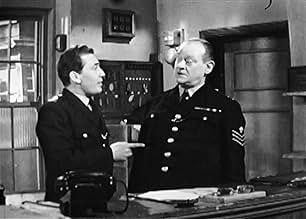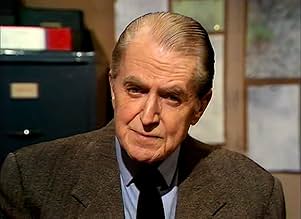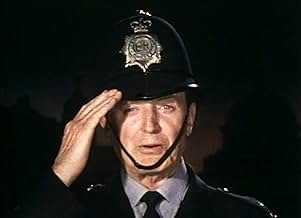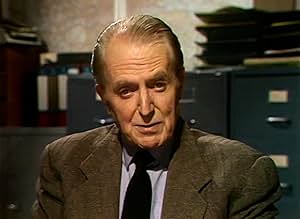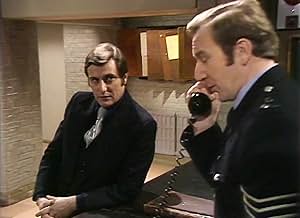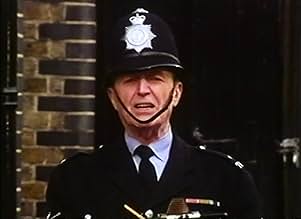Añade un argumento en tu idiomaConstable George Dixon and his colleagues at the Dock Green police station in the East End of London deal with petty crime, successfully controlling it through common sense and human underst... Leer todoConstable George Dixon and his colleagues at the Dock Green police station in the East End of London deal with petty crime, successfully controlling it through common sense and human understanding.Constable George Dixon and his colleagues at the Dock Green police station in the East End of London deal with petty crime, successfully controlling it through common sense and human understanding.
Explorar episodios
Reseñas destacadas
I'm afraid we all took this TV cop series for granted when it was on you don't know what you've got till it's gone. 432 episodes were broadcast 1955-1976, over 400 of them junked by the BBC all the way up to 1975 and not many illegally filmed by any of the TV viewers at the time either. It was PC George Dixon's, sorry, Jack Warner's show, it suited his avuncular personality down to the ground. In his case familiarity bred warmth. His weekly homily could range from you to be on your guard for scams to children to know their kerb drill, and other such laudable aims. When he started to get too old to pound the beat and others took up the stories instead it started to lose that special feeling the real world began to creep in. Saturday evenings were never the same again. When he stopped pounding the beat I think every copper in Britain must have done so too, and hardly any have been seen since.
The Roaring Boy broadcast 18.08.56: The programme was played live as was everything then and is one of a small group from the same period that managed to avoid being binned afterwards. Dixon has to check on whether army deserter skinny Kenneth Cope has been sighted in the neighbourhood, by going to see his girlfriend. He finds him and we're in for a tense psychological 15 minutes as psychological as Dixon was ever likely to get anyway. The story was bookended with an old lady gossipping to the station Sergeant which was reminiscent of Mrs. Lopsided in The Ladykillers which Warner had recently been in, even managing to be a Superintendent there. Peter Byrne who played Detective Andy for all those years made a brief appearance shortly before his marriage to Dixon's daughter Mary.
Unsensational and unrealistic as it may have been, 40 years ago it was as realistic as I wanted anything to get and want to get now. I don't need to graphically see how bad the baddies are because I don't consider myself to be one. And of course, were cops ever part of their communities as depicted at Dock Green? But great to see again to check how much our lovely society has progressed since then.
The Roaring Boy broadcast 18.08.56: The programme was played live as was everything then and is one of a small group from the same period that managed to avoid being binned afterwards. Dixon has to check on whether army deserter skinny Kenneth Cope has been sighted in the neighbourhood, by going to see his girlfriend. He finds him and we're in for a tense psychological 15 minutes as psychological as Dixon was ever likely to get anyway. The story was bookended with an old lady gossipping to the station Sergeant which was reminiscent of Mrs. Lopsided in The Ladykillers which Warner had recently been in, even managing to be a Superintendent there. Peter Byrne who played Detective Andy for all those years made a brief appearance shortly before his marriage to Dixon's daughter Mary.
Unsensational and unrealistic as it may have been, 40 years ago it was as realistic as I wanted anything to get and want to get now. I don't need to graphically see how bad the baddies are because I don't consider myself to be one. And of course, were cops ever part of their communities as depicted at Dock Green? But great to see again to check how much our lovely society has progressed since then.
I've watched the available episodes, and enjoyed them all, what I did enjoy, was the progression of it, the early ones seem so much more gentle, the crimes reflect the era, in the 70's episodes, time has changed, so has society, and ultimately so did the crimes, the episodes from what I saw, got a little more gritty, with Warner perhaps a little less visible. Compared to The Sweeney and The Professionals though, it was so much milder.
I must commend the acting of Jack Warner, absolutely brilliant throughout, what a talented actor, it's no wonder millions tuned in to watch him. The supporting cast each play their part, an array of well known faces appeared. I loved Dixon's addresses to the camera, I wonder if people did actually take note of the messages, the one that stood out, was a message about allowing strangers into your home.
This must be one of the earliest Police crime dramas, it's certainly one of the longest running. I wish all remaining episodes would get a DVD release. It's a shame they haven't made all on hand commercially available.
The Doctor Who fan in me is eternally sad that so many episodes (97) are missing, however when you dig into the history of this show, and realise that 400 of the 432 are missing, that is heart breaking. We can only hope one day that more are found, sadly it seems the earliest are lost to history.
I can understand why it's so loved by fans, I thoroughly enjoyed the episodes I've seen, 8/10.
I must commend the acting of Jack Warner, absolutely brilliant throughout, what a talented actor, it's no wonder millions tuned in to watch him. The supporting cast each play their part, an array of well known faces appeared. I loved Dixon's addresses to the camera, I wonder if people did actually take note of the messages, the one that stood out, was a message about allowing strangers into your home.
This must be one of the earliest Police crime dramas, it's certainly one of the longest running. I wish all remaining episodes would get a DVD release. It's a shame they haven't made all on hand commercially available.
The Doctor Who fan in me is eternally sad that so many episodes (97) are missing, however when you dig into the history of this show, and realise that 400 of the 432 are missing, that is heart breaking. We can only hope one day that more are found, sadly it seems the earliest are lost to history.
I can understand why it's so loved by fans, I thoroughly enjoyed the episodes I've seen, 8/10.
"Evening All." Dixon of Dock Green-which ran for 21 years and about 429 episodes-was a fine show about a salt of the earth copper called P.C. George Dixon who was played by Jack Warner. He looked far to old to be a police officer but that didn't matter to me.
I believe this is the longest running British police show ever (although that record may be beaten by The Bill in a few years time). It was entertaining stuff and I wish someone would release it onto DVD.
Watching the show now, you may think Dixon is an old fashioned relic but back when this show was broadcast, that is the way coppers were. The police has evolved since then but I will always have a place in my heart for P.C. Dixon.
P.C. Dixon was a good copper-he was honest, he was firm but fair when doing his job and he was a friendly local bobby. The stories were extremely interesting as was the dialogue. And the ending of the episodes were good as Dixon stood beneath the police stations lamp giving his thoughts for the day before walking off and whistling.
Eventually, Dixon was promoted to Desk Sergeant and the younger officers did the legwork but the stories were still top-notch.
This is probably the best representation of the police force in TV history and I urge anyone to try and get their hands on any of the episodes. It really was good.
I believe this is the longest running British police show ever (although that record may be beaten by The Bill in a few years time). It was entertaining stuff and I wish someone would release it onto DVD.
Watching the show now, you may think Dixon is an old fashioned relic but back when this show was broadcast, that is the way coppers were. The police has evolved since then but I will always have a place in my heart for P.C. Dixon.
P.C. Dixon was a good copper-he was honest, he was firm but fair when doing his job and he was a friendly local bobby. The stories were extremely interesting as was the dialogue. And the ending of the episodes were good as Dixon stood beneath the police stations lamp giving his thoughts for the day before walking off and whistling.
Eventually, Dixon was promoted to Desk Sergeant and the younger officers did the legwork but the stories were still top-notch.
This is probably the best representation of the police force in TV history and I urge anyone to try and get their hands on any of the episodes. It really was good.
I'm a police officer in the United States. Twenty-four years on duty and 56 years old. I was in my early thirties when I started and more aggressive in my demeanor. My wife has always been a fan of British Police programs. Initially I rolled my eyes at the "Bobby" but as I've gotten older, I've come to adopt the tactics of Dixon and others. Yes, they're fictional characters, but they are inspired by real world events. That low key approach works, saves me wear and tear and resolves things peacefully. Sometimes one must be strict, but often a soft shoe approach is better. A few younger officers are even looking towards me now which I never expected. Good show. One can learn a few things from it.
PC George Dixon died just 21 minutes into the film _The Blue Lamp (1950)_ (qv). When filler was needed after a season of _"Fabian of the Yard" (1954)_ (qv) ended 'Ted Willis' (qv) wrote six scripts with PC Dixon back in Dock Green. The series was steady, authentic, and even down to checking that: a) The helmet is kept on when entering a house, but b) is, out of courtesy, when addressing elderly ladies, and c) is removed and held neatly under the right arm when addressing a bishop. [not sure how many bishops where in the programme though] At a time when New York City would see more murders inn a week than Great Britain would in a year it is not surprising that Dock Green was a series of low-level crimes. A gentle series which meant George Dixon's promotion to sergeant in 1964 was a big change , caused in part by 'Jack Warner' (qv)'s arthritis and by his age . (70-year-old coppers don't walk the beat). This allowed the younger characters to come to the fore, although the violent crime rate was never increased just to keep ratings share. Jack's age and arthritis meant his character rarely left the station, and in the final seasons, rarely came from behind his desk. In 1976 the newer, more violent, cop shows won, and Dock Green Station finally closed its doors. Still, 21 minutes to 21 years isn't bad. Evenin' all
¿Sabías que...?
- CuriosidadesOnly 33 of the series' 432 episodes survive: 12 from the monochrome era (1955-1968) and 21 from the colour run (1969-1976). The others were wiped by the BBC. Seasons Three, Four, Six, Eight, Ten, Twelve, Sixteen and Nineteen are missing entirely; conversely the final, 22nd season is the only one to survive completely. Off-air recorded soundtracks also exist for Double Jeopardy (1968), The Trojan Horse (1968), Nightmare Hours (1971) and There's Your Story, There's My Story - And There's the Truth (1974), which were recovered in 2015.
- Citas
[repeated line]
PC George Dixon: Good evening, all.
- Créditos adicionalesEarly editions carried the sub-title: "Some Stories of a London Policeman".
- Banda sonoraAn Ordinary Copper
(uncredited)
Composed by Jeff Darnell
Arranged and Performed by Ken Jones and his Orchestra
[Second series theme tune]
Selecciones populares
Inicia sesión para calificar y añadir a tu lista para recibir recomendaciones personalizadas
- How many seasons does Dixon of Dock Green have?Con tecnología de Alexa
Detalles
- Color
- Relación de aspecto
- 1.33 : 1
Contribuir a esta página
Sugerir un cambio o añadir el contenido que falta

Principal laguna de datos
By what name was Dixon of Dock Green (1955) officially released in Canada in English?
Responde
